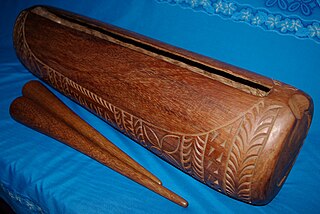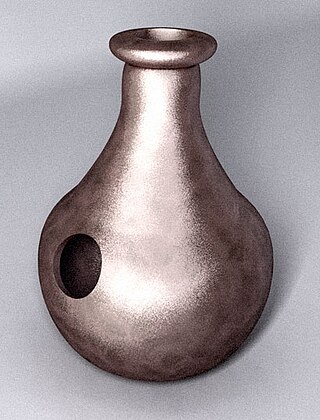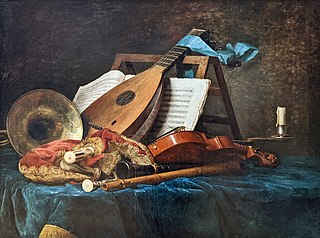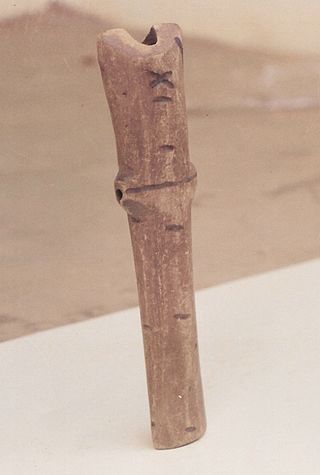
The drum is a member of the percussion group of musical instruments. In the Hornbostel-Sachs classification system, it is a membranophone. Drums consist of at least one membrane, called a drumhead or drum skin, that is stretched over a shell and struck, either directly with the player's hands, or with a percussion mallet, to produce sound. There is usually a resonant head on the underside of the drum. Other techniques have been used to cause drums to make sound, such as the thumb roll. Drums are the world's oldest and most ubiquitous musical instruments, and the basic design has remained virtually unchanged for thousands of years.

The music of Nigeria includes many kinds of folk and popular music. Little of the country's music history prior to European contact has been preserved, although bronze carvings dating back to the 16th and 17th centuries have been found depicting musicians and their instruments. The country's most internationally renowned genres are Indigenous, Apala, Aurrebbe music, Rara music, Were music, Ogene, Fuji, Jùjú, Afrobeat, Afrobeats, Igbo highlife, Afro-juju, Waka, Igbo rap, Gospel,Nigerian pop and Yo-pop. Styles of folk music are related to the over 250 ethnic groups in the country, each with their own techniques, instruments, and songs. The largest ethnic groups are the Igbo, Hausa and Yoruba. Traditional music from Nigeria and throughout Africa is often functional; in other words, it is performed to mark a ritual such as the wedding or funeral and not to achieve artistic goals. Although some Nigerians, especially children and the elderly, play instruments for their own amusement, solo performance is otherwise rare. Music is closely linked to agriculture, and there are restrictions on, for example, which instruments can be played during different parts of the planting season.

Developed and used by cultures living in forested areas, drums served as an early form of long-distance communication, and were used during ceremonial and religious functions.

The music of Zambia has a rich heritage which falls roughly into categories of traditional, popular and Christian music.

The music of Vanuatu may refer to any kind of music played in the country of Vanuatu.

The Music of Samoa is a complex mix of cultures and traditions, with pre- and post-European contact histories. Since American colonization, popular traditions such as rap and hip hop have been integrated into Samoan music.

A slit drum or slit gong is a hollow percussion instrument. In spite of its often being called a drum, it is not a true drum because it lacks a drumhead, the membrane stretched across the top of a true drum. It is classed instead as an idiophone in which the entire instrument vibrates.

The Pātē is a Samoan percussion instrument of Tahitian origin, named after the Samoan word for "beat" or "clap" "pulse". It is one of many Samoan log drum variants and is of the slit drum family, and therefore is also of the idiophone percussion family. It is made from a hollowed-out log, usually of Miro wood and produces a distinctive and loud sound. Different sizes of log drums offer different pitches and volumes, as well as striking the log drum in the middle or near the ends.

The kim-kim or Udu is a plosive aerophone and an idiophone of the Igbo of Nigeria. In the Igbo language, ùdù means 'vessel' or 'pot'. This is a hand percussion instrument and it is one of the most important instruments in Igbo music.
The atenteben(atɛntɛbɛn) is a bamboo flute from Ghana. It is played vertically, like the European recorder, and, like the recorder, can be played diatonically as well as chromatically. Although originally used as a traditional instrument, beginning in the 20th century it has also been used in contemporary and classical music. Several players have attained high levels of virtuosity and are able to play Western as well as African music on the instrument.
Arondizuogu (Aro-ndizuogu) is a town inhabited by the Aro people, an Igbo subgroup in Imo State of Nigeria. The Arondizuogu community is believed to have migrated from Arochukwu in the present Abia State to their current settlements in Imo State, which include the Okigwe, Ideato North and Onuimo local governments.

Igbo music is the music of the Igbo people, who are indigenous to the southeastern part of Nigeria. The Igbo traditionally rely heavily on percussion instruments such as the drum and the gong, which are popular because of their innate ability to provide a diverse array of tempo, sound, and pitch. Igbo music is generally lively, upbeat, and spontaneous which creates a variety of sounds that enables the Igbo people to incorporate music into almost all the facets of their daily lives. Some very popular Igbo musical styles are Igbo highlife, Ogene, Igbo gospel.
The music of the ancient Mayan courts is described throughout native and Spanish 16th-century texts and is depicted in the art of the Classic Period. The Maya played instruments such as trumpets, flutes, whistles, and drums, and used music to accompany funerals, celebrations, and other rituals. Although no written music has survived, archaeologists have excavated musical instruments and painted and carved depictions of the ancient Maya that show how music was a complex element of societal and religious structure. Most of the music itself disappeared after the dissolution of the Maya courts following the Spanish Conquest. Some Mayan music has prevailed, however, and has been fused with Spanish influences.
An Ikoro is a musical instrument created and used by the Igbo of Nigeria. It is a slit drum that is beaten with a stick or sticks and can be used in some parts of Igbo land for communicating, similar to a talking drum. Ikoro cannot be played by anyone. It is so special that any time its sound is heard people will gather at the village square. As soon as it sounds, people around assume that any of the following has happened: murder, land has been defiled, an outbreak of war, a calamity has befallen the community, etc. Any time the ikoro is heard, people gather at the village square to hear the latest developments. Ikoro also brings a sense of urgency.

Ogene is a style of Igbo music consisting of, and taking its name from, the ogene instrument, which is a large metal bell. The Ogene instrument has historically been made by the Igbo people of Nigeria. It is one of the most important metal instruments of the people.

A musical instrument is a device created or adapted to make musical sounds. In principle, any object that produces sound can be considered a musical instrument—it is through purpose that the object becomes a musical instrument. A person who plays a musical instrument is known as an instrumentalist. The history of musical instruments dates to the beginnings of human culture. Early musical instruments may have been used for rituals, such as a horn to signal success on the hunt, or a drum in a religious ceremony. Cultures eventually developed composition and performance of melodies for entertainment. Musical instruments evolved in step with changing applications and technologies.

Bamboo's natural hollow form makes it an obvious choice for many musical instruments. In South and South East Asia, traditional uses of bamboo the instrument include various types of woodwind instruments, such as flutes, and devices like xylophones and organs, which require resonating sections. In some traditional instruments bamboo is the primary material, while others combine bamboo with other materials such as wood and leather.

Ijele Masquerade, known as the biggest Masquerade in Sub-Saharan Africa, is a tradition of the Igbo people of Nigeria and was listed in the UNESCO Archives as an intangible cultural element in need of urgent safeguarding . In many communities in the state of Anambra in South-Eastern Nigeria, celebrations, burial ceremonies and other special occasions during the dry season to evoke fertility and a bountiful harvest feature the performance of the Ijele masquerade.

The ọjà is an integral part of the rich cultural heritage of the Igbo people and continues to play a significant role in their musical traditions. The Igbo people, who are indigenous to Nigeria, are renowned for the utilization of the ọjà (flute) traditional musical instrument in cultural activities or events. It is made from bamboo or metal and is played by blowing air into one end while covering and uncovering holes along the body to create different notes. The ọjà, which is skillfully carved from wood, produces a beautiful sound when played during songs. In traditional Igbo music, the ọjà is often performed in conjunction with a number of other instruments such as the ekwe, udu, igba (drum), ogene (bell), ichaka/0sha (rattle), okwa (gong), etc. These instruments complement each other to create a unique and distinct sound that characterizes the musical traditions of the Igbo people. The seamless integration of these instruments in musical performances highlights the strong musical heritage and cultural identity of the Igbo people.

Ejike Benedict Obiano known professionally as Ejyk Nwamba or Ogene master, is a Nigerian musician from Anambra State. One of the front men in Ogene music, a musical style which is popular in the Eastern part of Nigeria, Nwamba is regarded as the best Ogene musician in Igboland. He is the recipient of several accolades, including Artist of the Year at the 2021 Ukpor Special Awards and Best Indigenous Artist of the Year at the 2022 Anambra Legends Achievers Awards.














